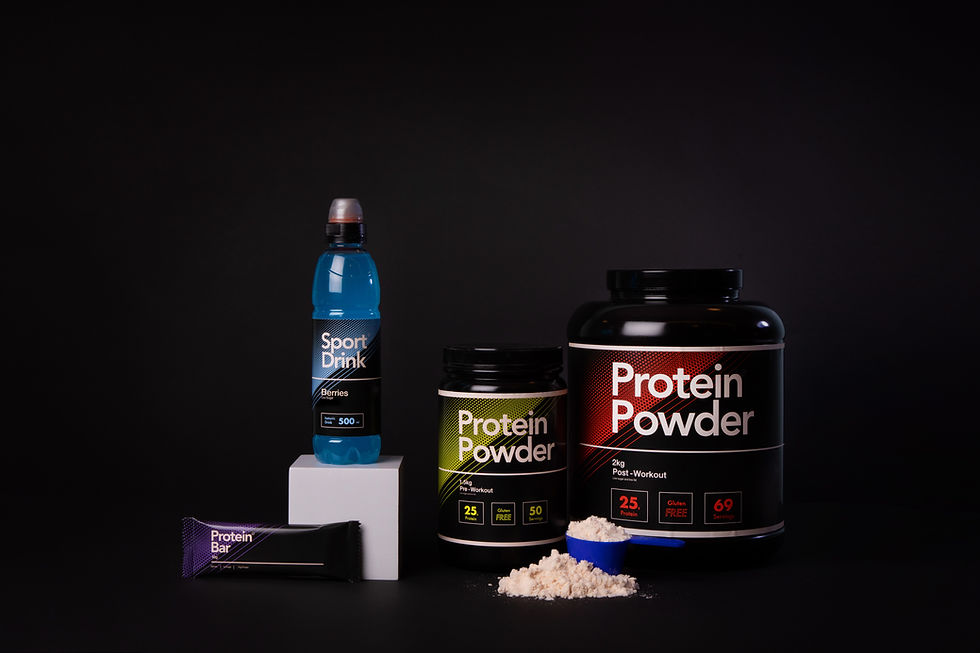Does It Matter How Much Protein You Eat? A Guide to Optimal Protein Intake
- icönik

- Oct 13, 2024
- 4 min read

Protein is one of the essential nutrients that our bodies need to function properly. It plays a crucial role in building and repairing tissues, producing enzymes and hormones, and supporting immune function. But how much protein should you really be eating? Does it matter if you consume more or less protein than recommended? In this blog post, we’ll explore the science behind protein intake and how to determine the right amount for your body’s needs.
Why Protein Intake Matters
Before we dive into the specifics, let’s talk about why protein is so important. Every cell in your body contains protein, and without adequate amounts, your body can’t perform many of its critical functions. For athletes and fitness enthusiasts, protein is especially vital for muscle repair and growth. However, it's not just gym-goers who need to pay attention to protein. Anyone looking to maintain a healthy weight, support metabolism, or preserve muscle mass as they age can benefit from getting enough protein.
But here's the question: how much protein is enough?
Recommended Protein Intake
The recommended dietary allowance (RDA) for protein is about 0.8 grams per kilogram of body weight for the average sedentary adult. This translates to roughly 56 grams of protein per day for men and 46 grams for women. However, these numbers are considered the minimum amount needed to prevent deficiency, not necessarily the ideal intake for optimal health, muscle growth, or fat loss.
For people who are active or trying to lose weight, protein needs increase. Many experts recommend 1.2 to 2.2 grams of protein per kilogram of body weight for those who are physically active, especially if they engage in strength training. This range supports muscle recovery, reduces muscle breakdown, and promotes fat loss.
How Much Protein for Muscle Growth?
If you’re focused on building muscle, protein plays a starring role. Consuming enough protein ensures that your body has the building blocks it needs to repair muscle tissues that break down during exercise. While it’s common knowledge that protein helps with muscle growth, the timing and amount of protein intake also matter.
Studies suggest that consuming 20-30 grams of high-quality protein per meal helps to maximize muscle protein synthesis—the process your body uses to build new muscle. Spreading your protein intake across several meals throughout the day is more effective than eating all your protein at once.
For athletes and bodybuilders, the general recommendation is to aim for 1.6 to 2.2 grams of protein per kilogram of body weight daily to maximize muscle gain.
Protein and Weight Loss
If your goal is weight loss, protein can be your best friend. Not only does it help preserve lean muscle mass while you’re cutting calories, but it also boosts your metabolism. Protein requires more energy to digest than fats or carbohydrates, which means you’ll burn more calories simply by eating it.
High-protein diets are also linked to increased feelings of fullness, helping to control hunger and reduce overall calorie intake. For those looking to shed pounds, 1.2 to 1.6 grams of protein per kilogram of body weight is often recommended. This amount strikes the balance between supporting fat loss and preserving muscle.
Can You Eat Too Much Protein?
While it’s important to get enough protein, the question remains: can you consume too much? In general, most people can safely eat more protein than the recommended minimum without any negative effects. However, excessively high protein intake—such as consuming more than 2.5 grams per kilogram of body weight—may be unnecessary unless you're an elite athlete.
In healthy individuals, there's little evidence to suggest that high protein intake is harmful. However, those with pre-existing kidney conditions should monitor their protein consumption, as excess protein can strain the kidneys.
Finding Your Optimal Protein Intake
To determine how much protein you should eat, consider your activity level, fitness goals, and body composition. Here are some general guidelines:
Sedentary individuals: Aim for 0.8 grams of protein per kilogram of body weight.
Moderately active people: 1.2 to 1.6 grams per kilogram is a good range to maintain health and support moderate exercise.
Athletes or bodybuilders: Shoot for 1.6 to 2.2 grams of protein per kilogram of body weight.
Those looking to lose weight: A high-protein diet (1.2-1.6 grams/kg) helps preserve muscle while promoting fat loss.
Conclusion: Does It Matter How Much Protein You Eat?
Yes, it does matter! Eating the right amount of protein for your goals—whether that’s muscle growth, weight loss, or maintaining overall health—can make a significant difference. While the recommended daily allowance is a good starting point, tailoring your intake based on your activity level and goals will help you achieve better results.
Always remember to balance your protein intake with a variety of nutrient-rich foods, including healthy fats and carbohydrates, to ensure you're getting a well-rounded diet.
If you're ever unsure about how much protein you need, consulting a nutritionist or dietitian can help you create a personalized plan to meet your health and fitness goals.












































Comments